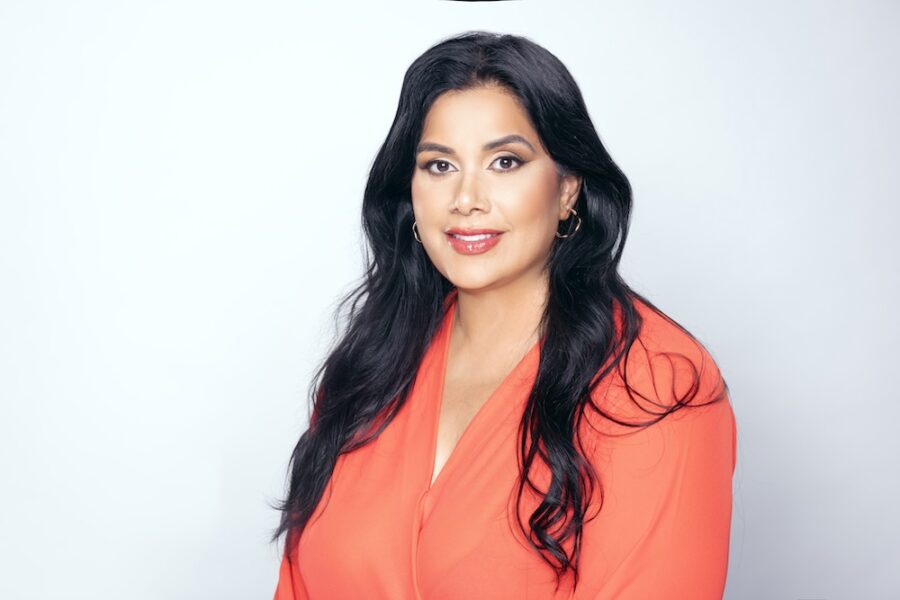 Have you heard? I’ve officially declared 2024, marked by a collective obsession with “Blush Blindness” and “Blush Controversy,” to be the Blushing year. Every line is on trend and launching never-before-seen, next-level cream and liquid blushes that threaten to render matte powder blushes quaint and retro. Some brands are killing it, and some have waded into intense controversy (need I say more…I doubt it) for edgier, editorial takes on what qualifies as pop of color and illumination along the cheekbones. Others are focusing on traditional principles of self-care and skin health, in tandem with tried and true color stories that leave all skin tones snatched, youthful, and glowing.
Have you heard? I’ve officially declared 2024, marked by a collective obsession with “Blush Blindness” and “Blush Controversy,” to be the Blushing year. Every line is on trend and launching never-before-seen, next-level cream and liquid blushes that threaten to render matte powder blushes quaint and retro. Some brands are killing it, and some have waded into intense controversy (need I say more…I doubt it) for edgier, editorial takes on what qualifies as pop of color and illumination along the cheekbones. Others are focusing on traditional principles of self-care and skin health, in tandem with tried and true color stories that leave all skin tones snatched, youthful, and glowing.
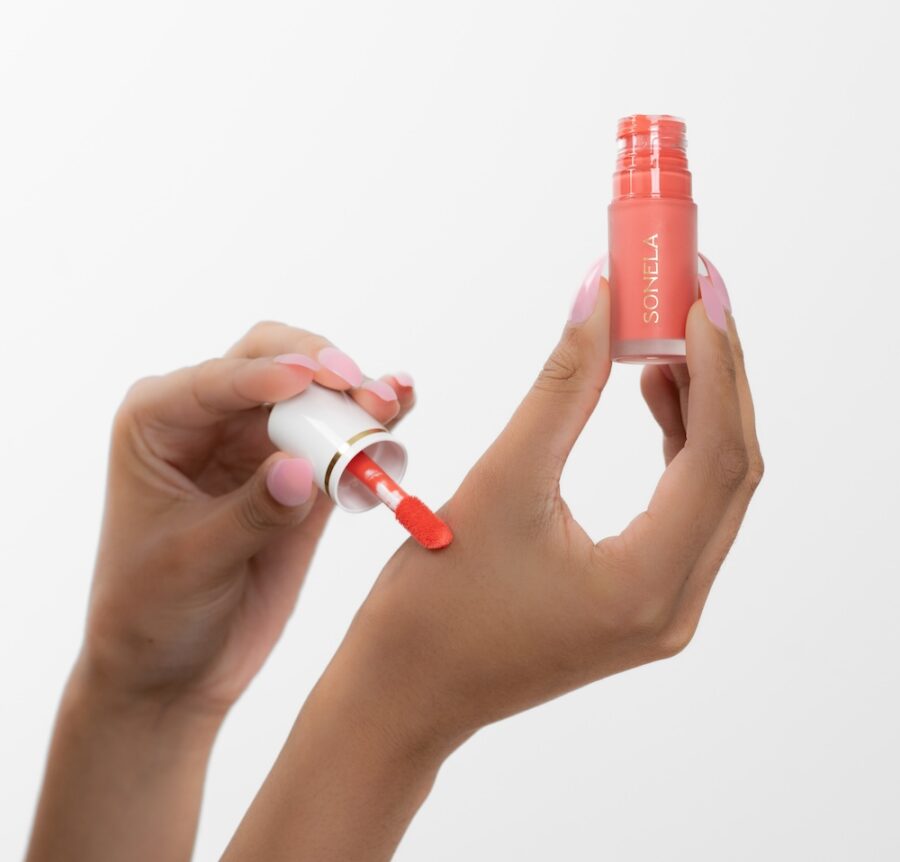 As for as bold, inclusive, pigmented fluids that also serve up a dose of skin care-level formulation, recently launched Sonela has upped the ante with the first line of clean liquid blushes and plumping lip glosses infused with adaptogenic botanicals in compliance with Ayurvedic tenets around the mind-body, mood-beauty connection.
As for as bold, inclusive, pigmented fluids that also serve up a dose of skin care-level formulation, recently launched Sonela has upped the ante with the first line of clean liquid blushes and plumping lip glosses infused with adaptogenic botanicals in compliance with Ayurvedic tenets around the mind-body, mood-beauty connection.
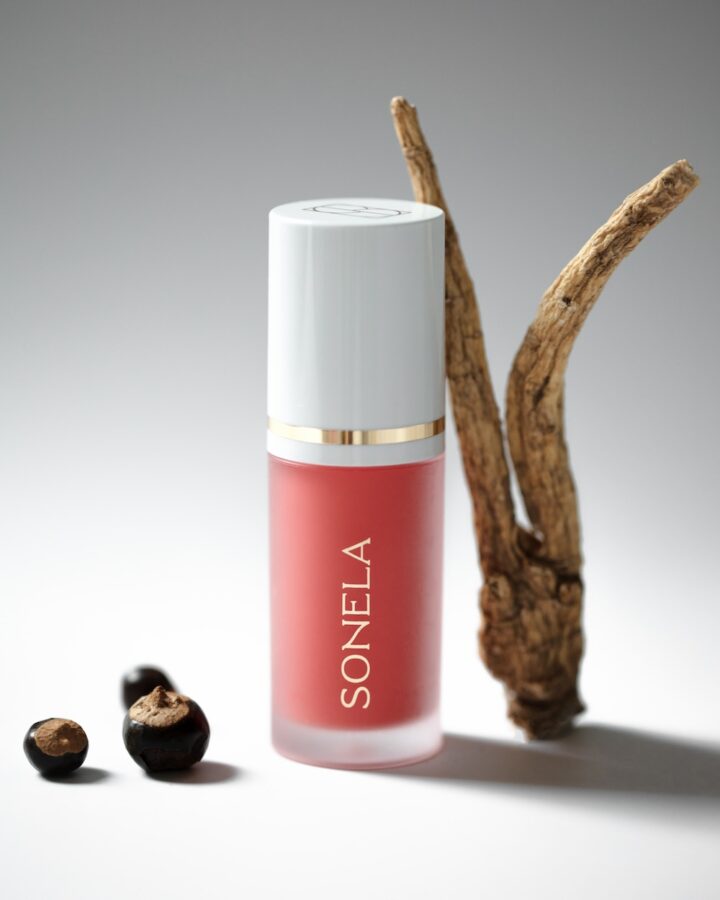 Honing in on the hormone that wreaks havoc when produced excessively in response to our stressed out, over-stimulated lifestyles, the herbs highlighted in all Sonela formulas tackle cortisol to rebalance, calm, and nourish the skin barrier. The adaptogenic powerhouse herbs ginseng and ginger bring a mega dose of vitality to the skin for radiance, while the base of hyaluronic acid, avocado oil, and shea butter hydrate in Blissful Moment Dewy Liquid Blush.
Honing in on the hormone that wreaks havoc when produced excessively in response to our stressed out, over-stimulated lifestyles, the herbs highlighted in all Sonela formulas tackle cortisol to rebalance, calm, and nourish the skin barrier. The adaptogenic powerhouse herbs ginseng and ginger bring a mega dose of vitality to the skin for radiance, while the base of hyaluronic acid, avocado oil, and shea butter hydrate in Blissful Moment Dewy Liquid Blush.
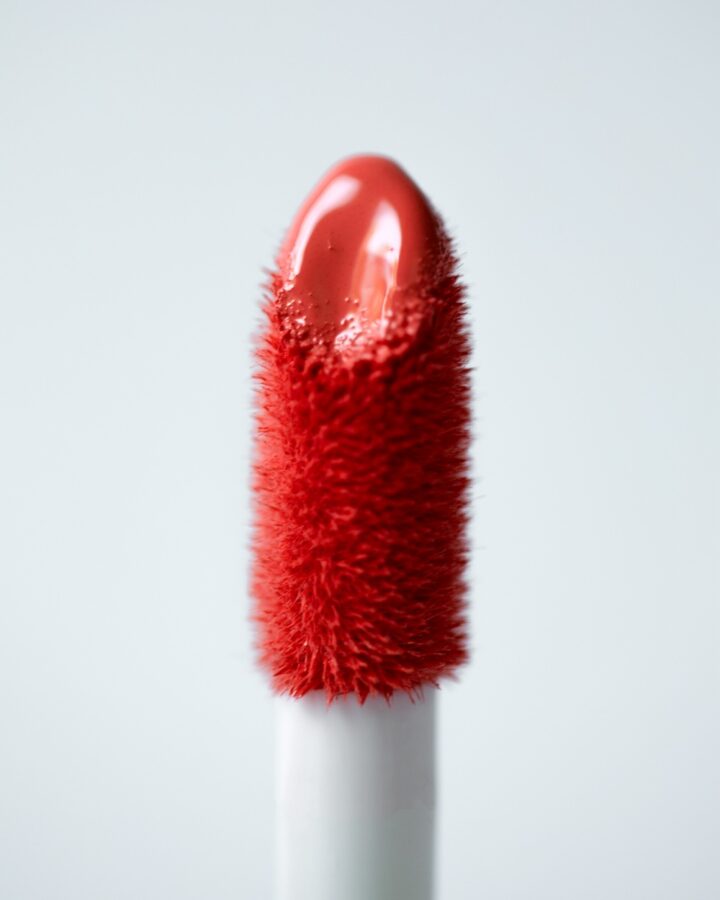 Available in five shades from pale and bright pinks, warm coral, dusty rose, and deep berry, these clean, ginseng-infused, pigmented liquid blushes blend in effortlessly and dry down within seconds for true-color payoff on all skin shades and skin types (even oily), for all-day wear.
Available in five shades from pale and bright pinks, warm coral, dusty rose, and deep berry, these clean, ginseng-infused, pigmented liquid blushes blend in effortlessly and dry down within seconds for true-color payoff on all skin shades and skin types (even oily), for all-day wear.
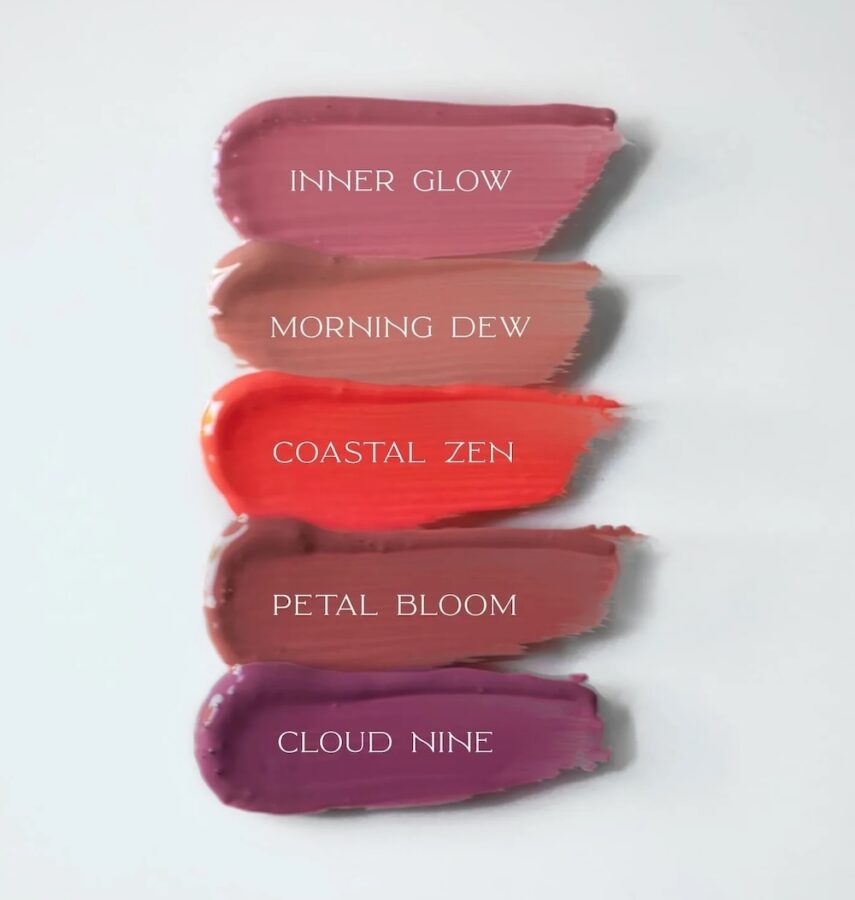 In a shade for shade match, Sonela’s Your Best Self Peptide Plumping Gloss offers lip maximizing shine in the same array of pinks, corals, rose, and berry, as well as a clear shade to coordinate with Blissful Moment Dewy Liquid Blush for unified, polished looks.
In a shade for shade match, Sonela’s Your Best Self Peptide Plumping Gloss offers lip maximizing shine in the same array of pinks, corals, rose, and berry, as well as a clear shade to coordinate with Blissful Moment Dewy Liquid Blush for unified, polished looks.
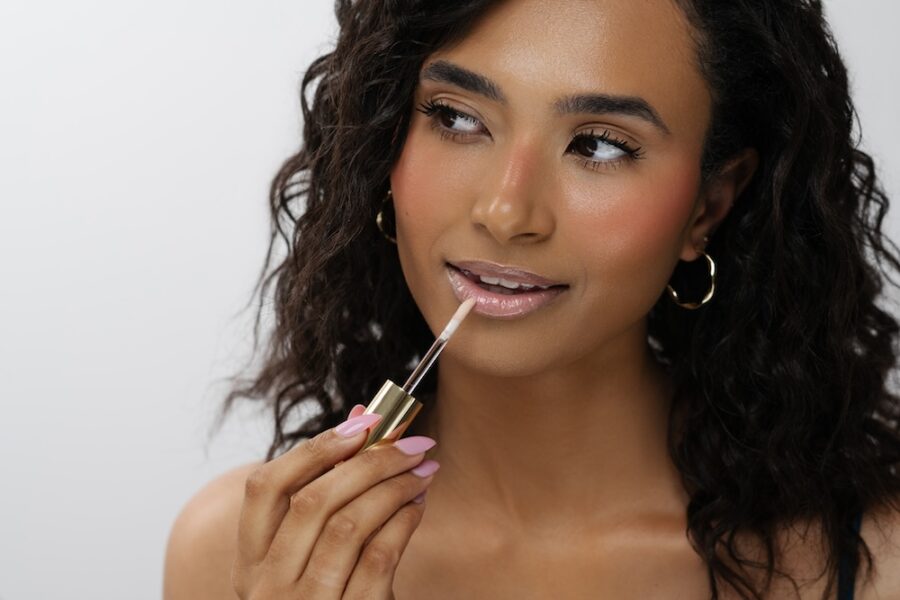 Bolstered with caffeine-alternative guarana to amp up lip volume, ginseng to support collagen production, and prickly pear, vitamins, and nutrients to hydrate and nourish without the typical sting. Cruelty-free, vegan, and free of the other ickies, Your Best Self Peptide Plumping Gloss gives the plump that keeps on plumping with cooling menthol for a pleasant, energizing sensation for your pout and your mood.
Bolstered with caffeine-alternative guarana to amp up lip volume, ginseng to support collagen production, and prickly pear, vitamins, and nutrients to hydrate and nourish without the typical sting. Cruelty-free, vegan, and free of the other ickies, Your Best Self Peptide Plumping Gloss gives the plump that keeps on plumping with cooling menthol for a pleasant, energizing sensation for your pout and your mood.
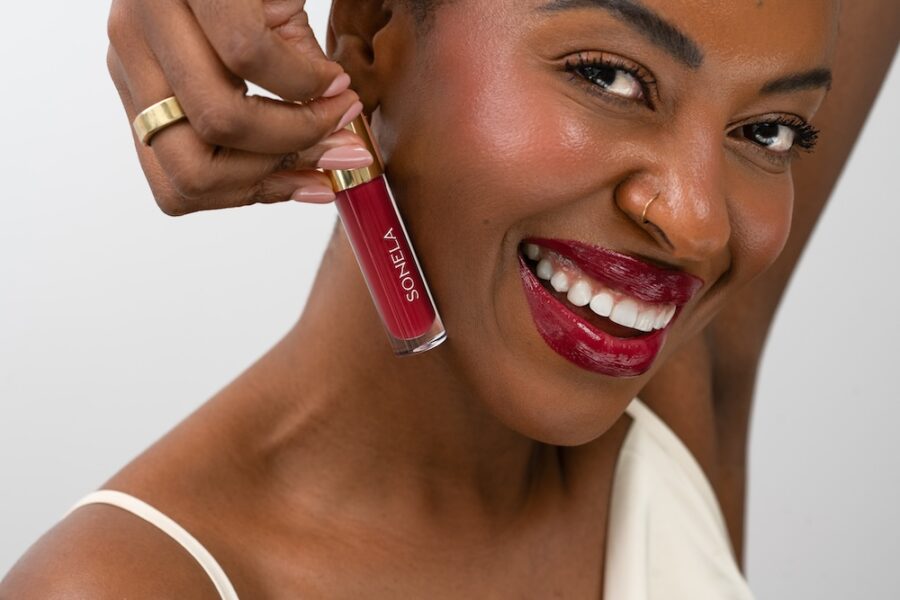 During the mild weather, I’ve been rocking the bright pink of CEO Goals lippie and Morning Dew cheekie for a Sabrina Carpenter flirty exuberance that always yields compliments from total strangers. When I descend into full gothy, witchy vibes for Scorpio season, I’ll have Show Stopper and Cloud Nine respectively in heavy rotation.
During the mild weather, I’ve been rocking the bright pink of CEO Goals lippie and Morning Dew cheekie for a Sabrina Carpenter flirty exuberance that always yields compliments from total strangers. When I descend into full gothy, witchy vibes for Scorpio season, I’ll have Show Stopper and Cloud Nine respectively in heavy rotation.
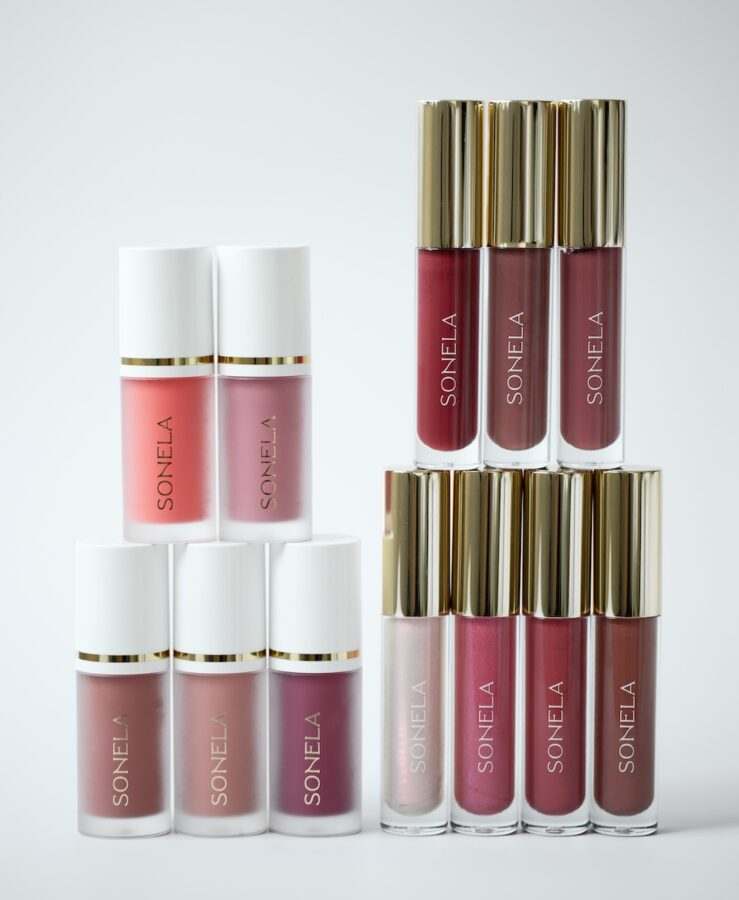 The female co-founder and CEO of Sonela knows first hand the overall toll of heightened cortisol levels on the mind-body, mood-beauty connection. I was thrilled to engage in a lengthy conversation with Sonia Singh about her recent launch, pivoting from a stressful corporate career, jumping head first in the beautysphere, the role of heritage in becoming an AAPI entrepreneur, and the future of clean beauty.
The female co-founder and CEO of Sonela knows first hand the overall toll of heightened cortisol levels on the mind-body, mood-beauty connection. I was thrilled to engage in a lengthy conversation with Sonia Singh about her recent launch, pivoting from a stressful corporate career, jumping head first in the beautysphere, the role of heritage in becoming an AAPI entrepreneur, and the future of clean beauty.
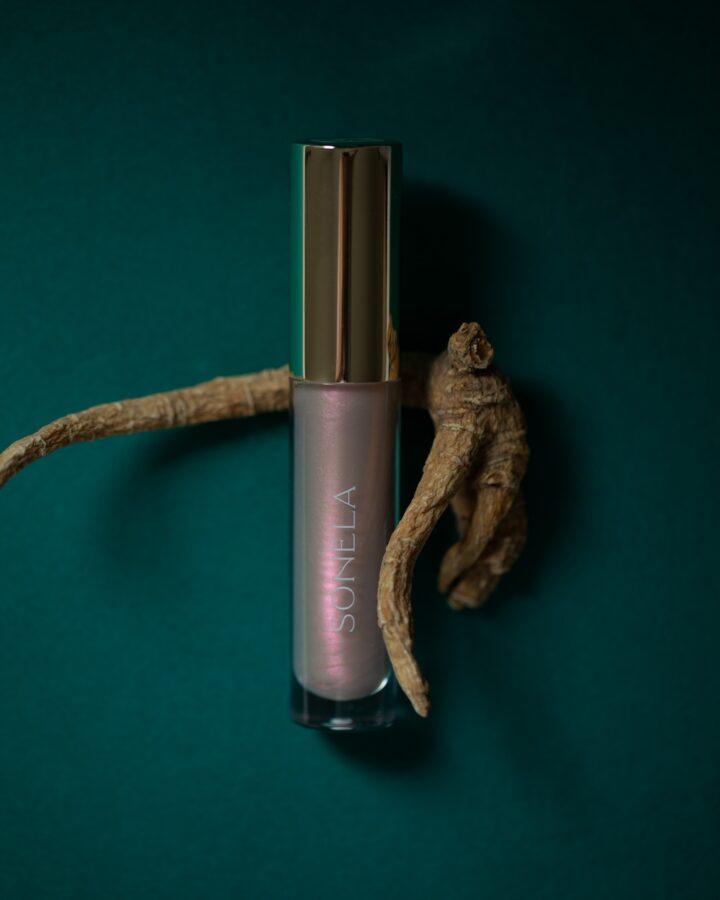 Q&A with Sonia Singh
Q&A with Sonia Singh
1. There’s no official designation for wellness or clean beauty – how do you define them personally and as an entrepreneur?
As the founder of Sonela, I define wellness and clean beauty through the lens of safety, transparency, and efficacy. Wellness, to me, is about achieving balance—nurturing both mental and physical health. It’s about supporting overall well-being in a holistic way, which is why our products are designed to work with the body’s natural processes and not against them.
When it comes to clean beauty, we abide by the strictest standards, ensuring that our products are free from harmful ingredients. At Sonela, we follow the guidelines of major regulatory bodies, including the FDA, Canadian, EU, and UK regulations. We’ve banned over 2,000 ingredients, such as silicones, sulfates, phthalates, and paraffin, to protect consumers from harmful chemicals. Additionally, we comply with the Sephora Clean and Credo Beauty standards, which means we meet rigorous criteria for clean formulations.
This commitment ensures that customers can trust Sonela not just for its effectiveness but also for the care that goes into every product’s formulation, aligning with the broader principles of clean beauty.
 2. What are your predictions for the next trends in wellness, skin, body and hair care for the summer and rest of the year?
2. What are your predictions for the next trends in wellness, skin, body and hair care for the summer and rest of the year?
Wellness: I see more brands incorporating Ayurvedic properties and focusing on mood-boosting adaptogens in their products, such as ashwagandha or turmeric. There’s also a growing trend in integrating mindfulness practices like deep breathing, positive affirmations, and meditation as part of daily routines, transforming mundane habits into mindful rituals that promote holistic well-being.
Skin: Skincare continues to evolve toward minimalism with effective, concise routines of 3-4 steps. The connection between mind, skin, and gut is becoming more prominent, with a focus on microbiomes playing a vital role in product formulations. Supplementation with healthy nutrients is also on the rise to support glowing skin from the inside out.
Body: I see a rising trend of using plant-based adaptogens and botanical extracts like chamomile, lavender, or reishi mushroom in body care products, particularly those targeting relaxation and sleep. These ingredients are becoming essentials in products like body mists, lotions, and oils designed to uplift mood and promote relaxation.
Hair: Haircare is shifting toward finding alternatives that promote natural texture, such as air-drying sprays and heat-free styling options. This trend caters to consumers seeking to reduce heat damage and embrace their natural hair texture while keeping routines simple and effective.
3. I’ve noticed an uptick in beauty brands that claim to be Ayurvedic, which I’d assumed was primarily a nutritional designation. How can you best explain Ayurvedic principles as they relate to overall wellness and as you’ve applied them to beauty?
My South Asian heritage has deeply influenced my connection to Ayurveda, a philosophy that means “The Science of Life” (with ‘Ayu’ meaning life, and ‘Veda’ meaning knowledge). Ayurveda is about creating harmony between the mind, body, and spirit, and this balance is critical for overall wellness, including our skin.
Growing up, my mother would often create natural skin remedies, like turmeric and honey masks, instilling in me the belief that beauty isn’t just skin-deep—it’s about nourishing the whole self. This concept of interconnectedness is foundational in Ayurveda: when one part of life is out of balance, it can affect everything, including how stress manifests on our skin. That insight has greatly shaped Sonela’s approach to beauty.
For example, during my corporate finance career, I experienced firsthand how stress triggered skin issues like acne flare-ups. It wasn’t until I began incorporating Ayurvedic practices like mindfulness and plant-based ingredients into my routine that I saw real change. This personal experience inspired Sonela’s formulations, which use Ayurvedic ingredients like Guarana and Ginseng to address not just surface-level concerns like acne and irritation, but also the underlying cause: stress. We aim to treat the mind and body together, acknowledging that skincare is an extension of overall wellness.
This holistic, Ayurvedic approach to beauty nurtures not only the skin but also one’s mental and emotional health, making it a cornerstone of Sonela’s philosophy.
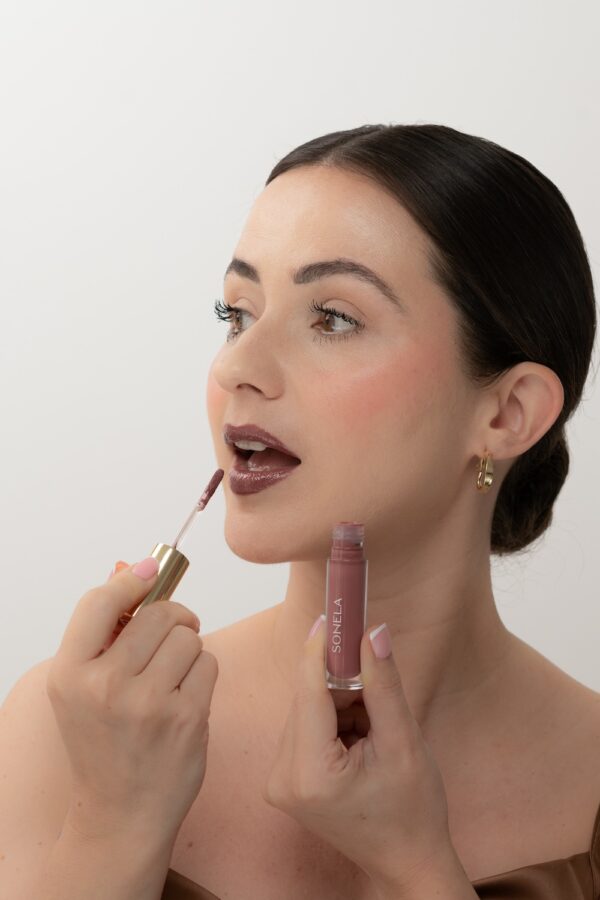
4. What are your favorite viral social media skin care hacks? What are the viral social media hacks that you think are the most dangerous?
One of my favorite viral skincare hacks is ice rolling. This practice is rooted in Ayurvedic traditions, where ice therapy, a form of cryotherapy, has been used to refresh the skin. I grew up using ice on my face, so seeing this become a viral trend on social media was no surprise. Ice rolling or applying ice cubes to your face before makeup helps reduce puffiness, minimizes pores, and soothes inflammation. It also acts as a great primer, making makeup stay on longer.
One of the most harmful viral trends I’ve seen is using toothpaste on pimples. While it may seem like a quick fix, most toothpaste contains ingredients that are too harsh for the skin, such as sulfates or drying agents. This can lead to burns, increased irritation, and redness, especially for acne-prone skin. It’s far safer to use products specifically formulated to treat acne rather than taking shortcuts that could cause long-term damage.
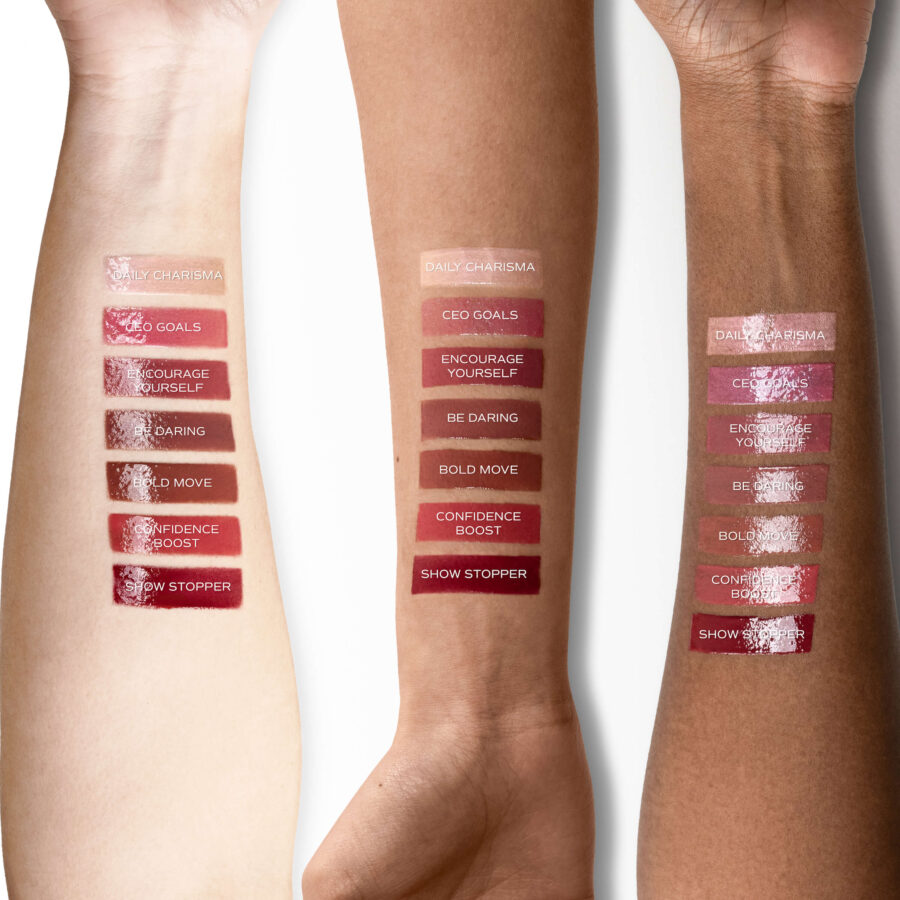 5. The beauty and wellness industries are sometimes criticized for fostering women’s insecurities about their appearance and exploiting that insecurity for profit, while others see the beauty/wellness industry as empowering. Where do you fall in this debate?
5. The beauty and wellness industries are sometimes criticized for fostering women’s insecurities about their appearance and exploiting that insecurity for profit, while others see the beauty/wellness industry as empowering. Where do you fall in this debate?
I firmly believe that the beauty and wellness industries hold immense potential for empowerment rather than exploitation. It takes vulnerability and confidence to openly express insecurities, and even more strength to channel those feelings into creating solutions that can uplift others. As someone who has navigated personal challenges with my own appearance, I can empathize with those feelings, which is why I feel so passionate about building a brand that focuses on healing from the inside out.
When I launched Sonela, it was not to play into insecurities, but to offer a space where people can feel seen, understood, and supported. It’s about taking control of your narrative—whether that means addressing stress-related skin issues or promoting holistic self-care routines. Empowering others means being the voice I wish I had growing up, and helping people feel their best—without guilt or pressure—is at the core of what we do.
Building a brand, particularly in beauty and wellness, takes perseverance and a deep understanding of the complexities of confidence and self-expression. It’s a journey that requires years of hard work, sacrifice, and unwavering belief in your mission. It’s strong, dedicated women behind these brands who are leading with empathy, not exploitation. Empowerment means creating spaces where everyone feels validated in their skin and beauty journey, without perpetuating unrealistic standards.
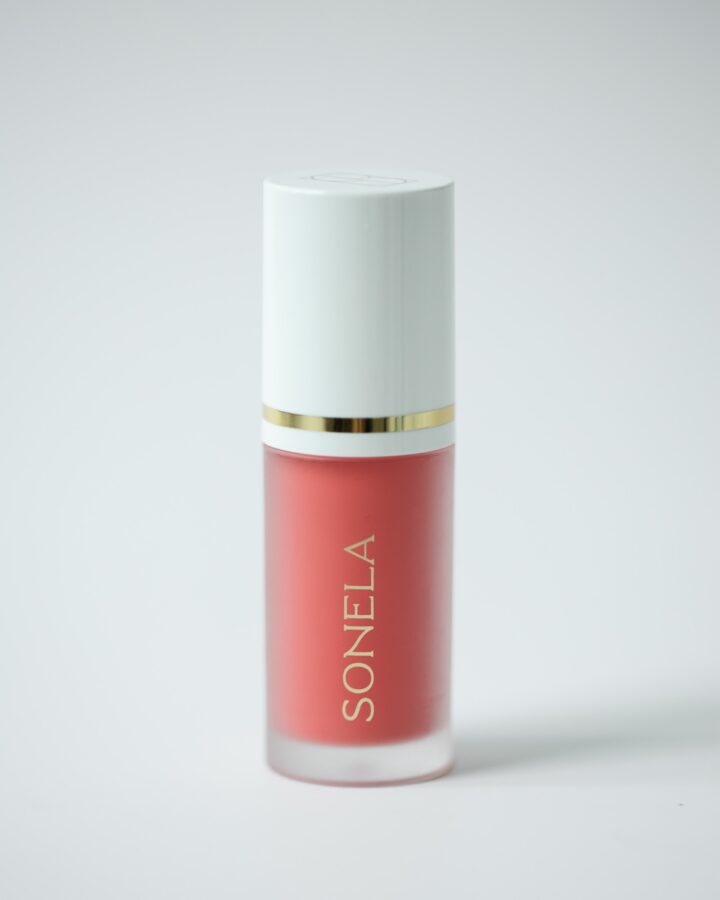 6. Was your line born out of frustration with the existing marketplace? Or were you motivated to address a specific need not addressed by most brands?
6. Was your line born out of frustration with the existing marketplace? Or were you motivated to address a specific need not addressed by most brands?
Sonela was born out of both frustration with the existing marketplace and a personal need that wasn’t being met by the products available. For over a decade, I struggled with cystic acne, a journey that took a huge toll on my self-esteem. I spent years searching for skincare solutions, but most products either worsened my symptoms or contained pore-clogging ingredients, leaving me in a constant state of frustration.
The turning point came during my fast-paced corporate career, where the stress of advancing through roles only aggravated my skin problems further. By the time I was a VP of Finance, managing billion-dollar revenue streams, my skin flare-ups became more severe due to heightened cortisol levels. That’s when I began to understand the strong connection between stress and skin health. I realized that most brands weren’t addressing this link between stress-induced skin conditions and internal well-being.
From this experience, I was motivated to create Sonela—a brand that not only tackles surface-level skin issues but also addresses the underlying causes, like stress, by incorporating Ayurvedic principles and adaptogens. My journey taught me that beautiful skin starts from within, and I wanted to offer products that reflected that holistic approach to beauty and wellness.
7. To what do you attribute this current boom in skincare, selfcare, and the wellness industries?
The current boom in skincare, self-care, and wellness industries can be attributed to several factors:
a. Increased Awareness of Holistic Health: Consumers today are more educated about the connection between mental, physical, and emotional health. Skincare and self-care routines are increasingly seen as part of a broader approach to overall well-being, where people focus on mental health, mindfulness, and stress management as much as physical appearance.
b. Rise of Personalization: With advancements in technology and product formulation, consumers now have access to personalized skincare regimens that cater to specific skin concerns. The focus on customized products makes consumers more engaged and invested in their skincare journey.
c. Mental Health and Self-Care: The wellness industry is closely tied to mental health awareness, and self-care practices are viewed as essential to mental well-being. From using adaptogens in skincare to mindfulness practices, consumers are drawn to products that offer stress relief and emotional balance.
d. Clean Beauty Movement: Consumers are becoming increasingly conscious of the ingredients in their skincare products, leading to a rise in demand for clean, sustainable, and ethically sourced products. Brands that focus on natural and organic ingredients, as well as eco-friendly practices, are driving the growth of the industry.
The convergence of these factors, along with the influence of wellness trends and a desire for more intentional living, has pushed skincare and self-care to the forefront of modern lifestyles.
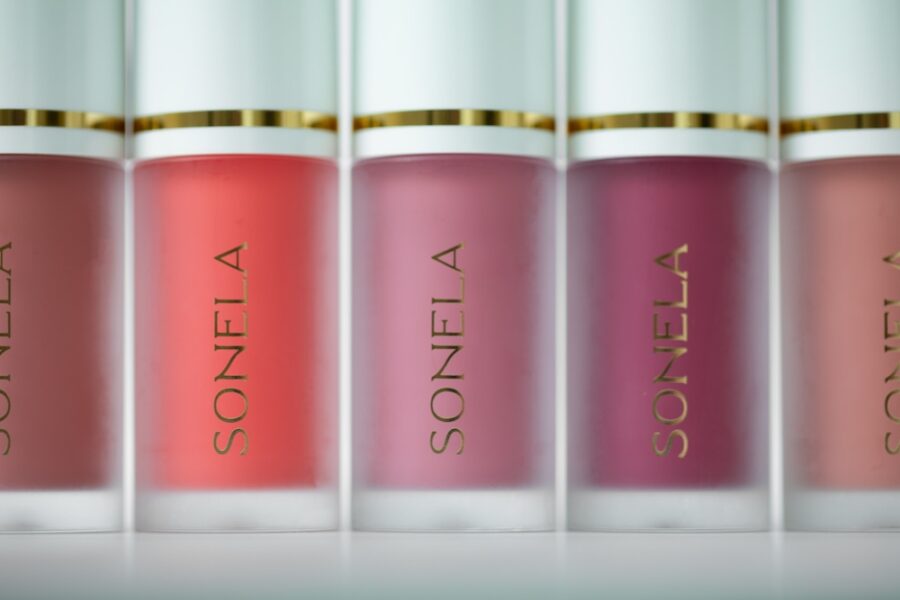 8. What was your eureka moment, when you knew deep-down that it was the time in your life, and in the market, to start your own business?
8. What was your eureka moment, when you knew deep-down that it was the time in your life, and in the market, to start your own business?
My “eureka” moment came during the pandemic, as stress levels and mental health issues skyrocketed worldwide. Having dealt with my own struggles with stress-induced skin conditions, I began wondering how cortisol, a stress hormone, was impacting the skin health of others. This led me to deeper research into the mind-skin connection, where I discovered a gap in the beauty market. I realized that there weren’t enough products designed to address both the internal causes of skin problems—like stress—and the external symptoms.
Additionally, my entrepreneurial spirit has been ingrained in me from a young age. Growing up, I naturally assumed leadership roles, whether at school, work, or in my personal life, and my father, who was also an entrepreneur, always inspired me. Watching him taught me the importance of resilience, vision, and passion in building something meaningful. Before starting Sonela, I made sure to build my foundation in finance and business operations, learning the ins and outs of managing a company.
This combination of a personal mission to address a significant gap in the market and my innate drive to lead solidified that it was the right time for me to start my own business.
9. What had you wished a more seasoned business owner in any industry had told you when you started?
When I started my journey, I wished someone had told me two key pieces of advice that are often overlooked.
First, trust your instincts. As a new entrepreneur, you will receive advice from all angles—family, friends, industry experts, and even strangers. While feedback can be valuable, not all advice will suit your vision or your brand’s unique needs. It’s crucial to listen to your gut and make decisions that align with your core values and mission, even if they venture outside your expertise. This instinctual approach is vital in navigating the complex landscape of entrepreneurship.
Second, embrace the long game. Building a brand is not an overnight endeavor; it takes time, patience, and resilience. There will be ups and downs, and it’s easy to get caught up in the hustle and the pressure to succeed quickly. I learned the importance of enjoying the process, celebrating small wins, and giving myself grace along the way. Understanding that success unfolds over time can relieve some of the pressure and allow for a more fulfilling journey.
By keeping these principles in mind, I’ve been able to navigate my path with a clearer focus and a more balanced perspective.
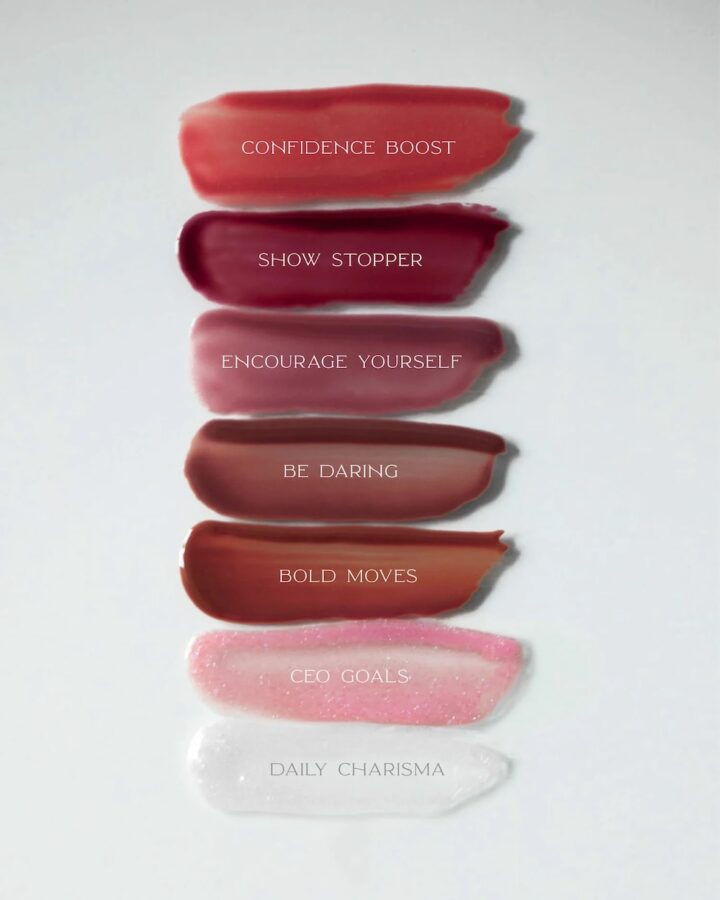 10. Do you have formal business training, such as an MBA, or a similar degree in chemistry? Or is your professional background mostly in the beautysphere?
10. Do you have formal business training, such as an MBA, or a similar degree in chemistry? Or is your professional background mostly in the beautysphere?
I have a robust academic and professional background that contributes to my expertise in the beauty industry. I graduated with honors in Accounting and Economics from Seton Hall University in 2007, followed by my MBA in Finance and Supply Chain from Rutgers University in 2014. This formal business training provided me with a solid foundation in financial management and strategic operations.
In addition to my academic credentials, I have nearly 20 years of experience in the finance industry, working for major corporations such as S’well Bottle, Wilhelmina Models, and Beggars Music Group. My career trajectory has allowed me to quickly advance to leadership roles, including serving as a VP of Finance, where I managed revenue streams of up to $1 billion. This extensive experience equips me with valuable skills to navigate the complexities of building and managing a brand in the beauty space, combining my entrepreneurial spirit with a deep understanding of business operations.
My father, Balbir Singh, is an entrepreneur with a chemistry degree, which has further enhanced Sonela’s commitment to creating effective, high-quality products rooted in science and wellness.
11. Is sustainability compatible with ROI and business growth?
Absolutely, I believe sustainability is a necessity in today’s business landscape. I’ve noticed that more and more customers are demanding sustainable practices from the brands they choose. Adopting sustainable practices not only optimizes energy use and reduces waste but also improves the overall economy. By integrating sustainability into my business model, I can contribute to a circular economy and lessen our environmental impact.
a. Consumer Demand: I’ve seen firsthand how consumers are increasingly willing to pay a premium for sustainable products. According to a Nielsen study, 66% of global consumers are open to spending more on brands that are committed to sustainability, which highlights a clear market demand. Aligning my practices with consumer values not only enhances my brand’s reputation but also attracts a loyal customer base.
b. Cost Savings: In my experience, implementing sustainable practices often leads to significant cost savings over time. By optimizing energy use and reducing waste, I can lower operational costs. The World Economic Forum notes that companies embracing sustainability tend to improve their efficiency and productivity.
c. Attracting Investment: I’ve also observed a growing trend where investors prioritize environmental, social, and governance (ESG) criteria when making decisions. A report by MSCI indicates that companies with strong sustainability practices frequently enjoy lower capital costs and better operational performance, which is crucial for long-term success.
d. Innovation and Competitive Advantage: Embracing sustainability has fostered innovation within my business. By developing eco-friendly products and sustainable supply chains, I can differentiate my brand in a competitive market. Research from Harvard Business Review emphasizes that sustainability drives innovation, leading to new products and services that cater to evolving consumer demands.
I firmly believe that integrating sustainability into my business model not only enhances ROI but also opens up growth opportunities and positively impacts the environment. Brands that successfully navigate this landscape not only meet consumer expectations but also position themselves for long-term success in a competitive marketplace.
12. How do you make sure that you stay tapped into the market in a way that promotes longevity instead of just riding trends?
Staying connected to the market and ensuring longevity rather than just riding trends is essential for me as a founder. First and foremost, I believe in listening to the needs of my customers and being attuned to their daily frustrations. This insight helps me create products that genuinely address their concerns.
Equally important is having a strong brand identity that resonates with my audience on an emotional level. I consistently refer back to my “why” when making decisions, ensuring that every step I take aligns with the core values of my brand.
Relying solely on numerical data isn’t enough. I strive to stay ahead of the curve by actively seeking out emerging trends and new technologies in the beauty space. This proactive approach allows me to anticipate market shifts rather than merely react to them.
Diversity is also a critical factor for me. It’s essential to offer a range of shades that cater to different skin tones, as this inclusivity builds a deeper connection with a wider audience.
While introducing trendy products can be exciting, I know that to maintain longevity in the market, I need to balance these with timeless classics—like gloss or blush—that consistently appeal to consumers. This strategy not only keeps my brand relevant but also fosters lasting relationships with my customers.
13. When the next generation of women beauty entrepreneurs make themselves known, how will you help or support them?
When the next generation of women beauty entrepreneurs emerge, I’m committed to supporting them through a partnership with my alma mater, Seton Hall University. Together, we’ve established an internship program designed to nurture and develop young talent.
This initiative focuses on providing hands-on training and mentorship in crucial areas such as entrepreneurship, product development, and marketing. I believe that the real-world experience interns gain at a startup is invaluable, as it allows them to apply the skills and knowledge they’ve acquired in the classroom to actual business scenarios.
By equipping these future leaders with practical insights and guidance, I hope to empower them to navigate the beauty industry confidently and successfully, helping to pave the way for a more diverse and innovative landscape.
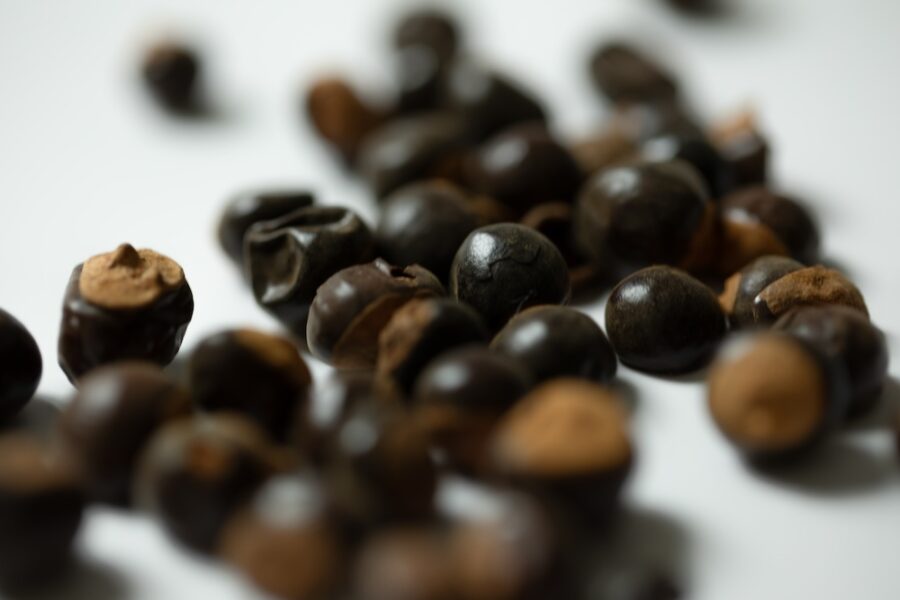 14. What are your top 3 favorite ingredients, sources, and/or methods of extraction for clean ingredients?
14. What are your top 3 favorite ingredients, sources, and/or methods of extraction for clean ingredients?
a. Guarana (Paullinia cupana) – Guarana seeds are renowned for their antioxidant properties, helping to revitalize dull skin and provide a toning and firming effect. This ingredient is particularly beneficial for those looking to enhance skin brightness and overall texture.
b. Ginseng – The root of the ginseng plant is a powerful rejuvenator, known for boosting collagen production and enhancing skin circulation. Ginseng provides a brightening effect and helps hydrate the skin, making it a versatile ingredient in skincare formulations.
c. Prickly Pear (Opuntia ficus-indica) – Prickly pear is rich in Vitamin E and antioxidants, offering deep hydration and promoting skin brightness. Its ability to nourish and protect the skin makes it a popular choice in clean beauty products.
d. Hyaluronic Acid – While not exclusively Ayurvedic, hyaluronic acid is a key ingredient for retaining moisture. It helps plump the skin and maintain hydration levels, contributing to a healthy and youthful appearance.
These ingredients not only reflect a commitment to clean beauty but also align with the principles of holistic wellness found in Ayurvedic practices. They emphasize the importance of nurturing the skin with natural, effective solutions.
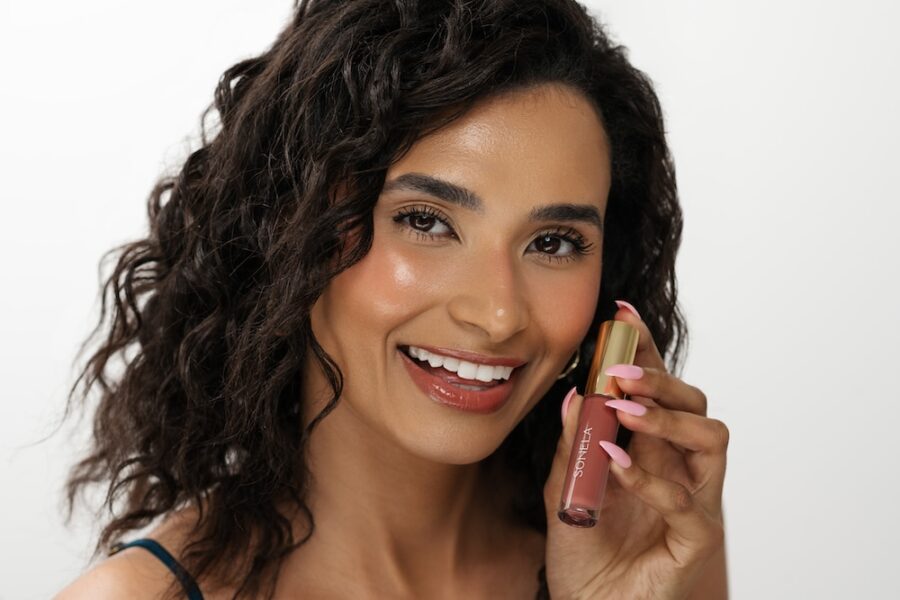 15. What’s your most essential platform/source/voice for market research?
15. What’s your most essential platform/source/voice for market research?
For me, attending 2-3 trade shows each year is essential for staying updated on the latest ingredients and product developments in the beauty industry. These events allow me to learn about emerging technologies and participate in panel discussions on various relevant topics.
Additionally, I find that visiting retailers like Sephora and Ulta is invaluable. Engaging with employees and customers provides real-time insights into consumer concerns and preferences. This first hand interaction helps me understand how to diversify our product range to be more inclusive and meet customer needs effectively.
I also make it a point to read reviews on platforms like Reddit and Amazon. Analyzing customer feedback on these sites allows me to identify what makes a product successful or why it might fall short, which is crucial for informed decision-making in product development.
These approaches collectively ensure that I stay tapped into the market and can make strategic decisions that resonate with our audience.
16. Where do you see or hope to see the beauty and wellness industry in a few years?
In a few years, I hope to see the beauty and wellness industry move toward more advanced technology and personalization in products. With the rapid advancements in AI and technology, I envision a future where consumers can use at-home skin scanners to determine their ideal foundation or BB cream shade, receiving personalized recommendations for color matching.
We’ve already seen trends like tubing technology in mascara and pH-balanced lip products gain popularity. As technology evolves, I anticipate that more products will feature multifunctional or minimalist designs, making beauty routines more efficient and effective.
Moreover, I believe that the concept of Ayurvedic beauty and the mind-skin connection will become more prominent, allowing brands to connect with consumers on a deeper emotional level. I also expect that diversity standards will continue to play a crucial role in this evolution, ensuring that products are inclusive and cater to a wider range of skin tones and types. Overall, I’m excited about the future of our industry and the innovations that lie ahead.
17. In addition to clean formulations and sustainable practices, diversity is one of the hottest trends in beauty and wellness. How does Sonela approach/embrace diversity?
At Sonela, embracing diversity is an inherent part of our brand ethos. As someone with dark skin, I find it essential to ensure that inclusivity is a fundamental consideration in our product development. From the very beginning, we’ve made a concerted effort to be inclusive of various skin tones.
During our product color testing phases, I was particularly focused on matching shades to different skin tones. I personally tested all colors on my skin to ensure they were flattering and effective. A unique challenge with lip products is that we also need to consider lip tones, so we not only prioritized a range of skin tones but also took lip tones into account to create a truly diverse product line.
Ultimately, my commitment to diversity goes beyond just meeting a trend; it’s about reflecting the real beauty of our customers and ensuring everyone feels represented and valued.
 18. It’s hard to believe that there are still skeptics out there about the benefits of dedicated skin care, hair care and wellness regimens, especially to treat skin, scalp, and hair problems. How do you address that skepticism?
18. It’s hard to believe that there are still skeptics out there about the benefits of dedicated skin care, hair care and wellness regimens, especially to treat skin, scalp, and hair problems. How do you address that skepticism?
I understand that skepticism about the benefits of dedicated skincare, hair care, and wellness regimens can stem from various sources, such as concerns about greenwashing or misleading marketing practices. Many consumers are rightfully cautious, especially given the prevalence of false information and exaggerated claims in the beauty industry.
To address this skepticism, I focus on transparency and education. At Sonela, we prioritize providing clear, evidence-based information about our products, including their ingredients and benefits. I believe in the importance of clinically tested formulations and making the science behind our products accessible to our customers.
Moreover, I think it’s crucial to encourage consumers to do their own research. Engaging with reliable sources, reading reviews, and understanding the formulations can empower consumers to make informed decisions. I also advocate for ethical practices within the industry, emphasizing the importance of brands being held accountable for their claims and the efficacy of their products.
Ultimately, by promoting transparency and encouraging an informed dialogue, I hope to build trust and demonstrate that dedicated skincare and wellness regimens can have a significant positive impact on individual health and well-being.
——–
Previous Q&As in the Female Entrepreneur in Clean Beauty Series:
Read Part 1 in the “Female Founders Q&A” series with the Glow Bar CEO HERE.
Read Part 2 in the “Female Founders Q&A” series with the Uzima CEO HERE.
Read Part 3 in the “Female Founders Q&A” series with the Kinship CEO HERE.
Read Part 4 in the “Female Founders Q&A” series with the Raw Sugar Living CEO HERE.
Read Part 5 in the “Female Founders Q&A” series with the Alchimie Forever CEO HERE.
Read Part 6 in the “Female Founders Q&A” series with the Kindness Powered Skincaee CEO HERE.
Read Part 7 in the “Female Founders Q&A” series with the Iles Formula CEO HERE.
Read Part 8 in the “Female Founders Q&A” series with the Blessed Bananas CEO HERE.
Read Part 9 in the “Female Founders Q&A” series with the Exoceuticals CEO HERE.
Read Part 10 in the “Female Founders Q&A” series with the Nekko CEOs HERE.
Read Part 11 in the “Female Founders Q&A” series with the Made By Dentists CEO HERE.
Read Part 12 in the “Female Founders Q&A” series with the MrayaBeauty CEO HERE.

